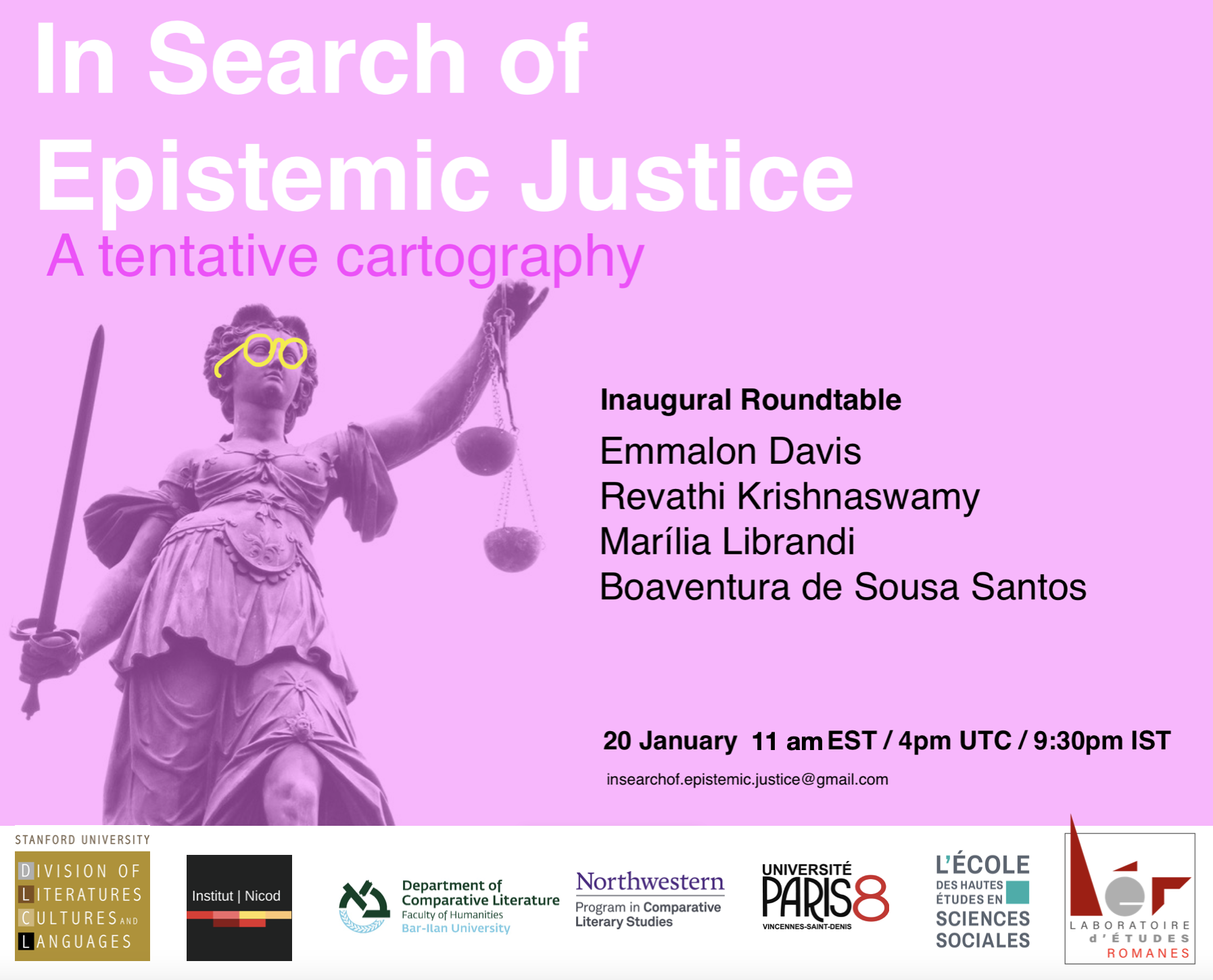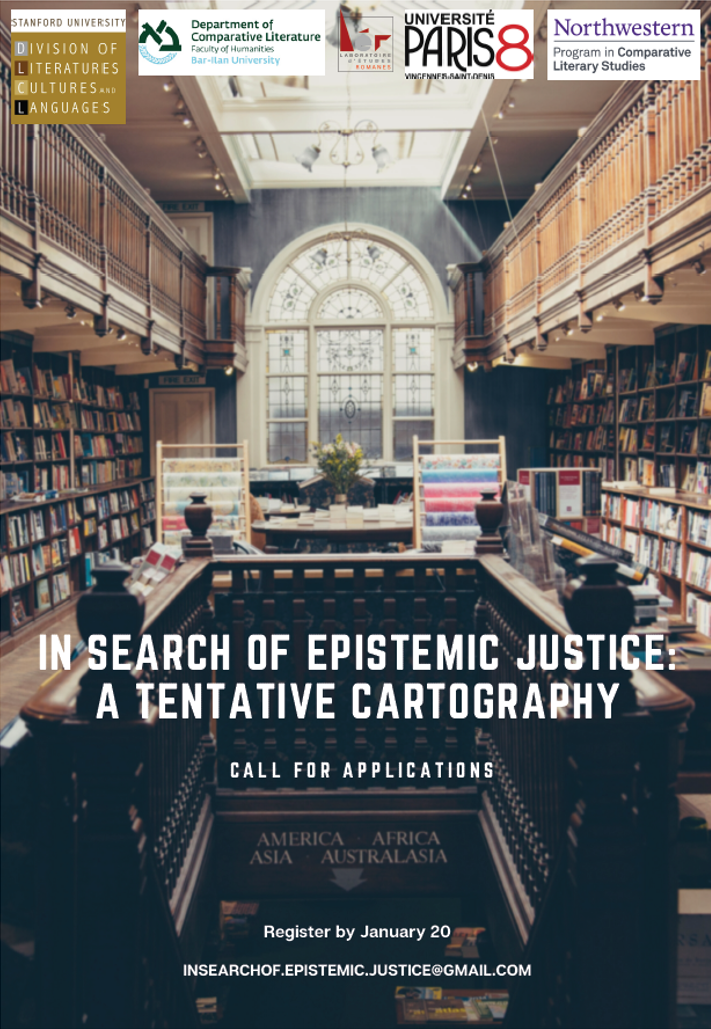Accueil > Actualités > WEBINAR ǀ "In Search of Epistemic Justice - A tentative cartography"
WEBINAR ǀ "In Search of Epistemic Justice - A tentative cartography"
"In Search of Epistemic Justice — A tentative cartography" is a webinar and working group co-organised by :
- Chen Bar-Itzhak (Department of Comparative Literature, Bar-Ilan University)
- Micol Bez (Institut Jean Nicod / École Normale Supérieure / Northwestern University)
- Angelo Vannini (Laboratoire d’Études Romanes, Université Paris 8 Vincennes - Saint Denis)
- Victoria Zurita (Division of Literatures, Cultures and Languages, Stanford University)
This seminar started from the desire for an interdisciplinary and interinstitutional space to discuss the question of epistemic justice in its widest sense, within and beyond its western conceptualisations and its specific developments stemming from critical and social epistemology. What we saw was a wide-spread concern – across disciplines and methods, across epistemic spaces even – in a common problem : that of the violence that knowledge itself can produce as a byproduct, as well as the harms that we can suffer in our capacity as knowers. The question was, then, that of opening a dialogue across disciplines to investigate the different ways in which we diagnose and critique the same phenomena of epistemic violence and injustice, trying to collectivize our tools for epistemic resistance. This seminar and working group aims to be a space for scholarly discussion in a multiplicity of forms : from great talks and round tables, to peer support for early-career researchers and workshops to discuss work-in-progress.
First Event - Round Table - 20 January 2022
The first event will inaugurate the program with an example of the kind of rigorous interdisciplinary dialogue that we aim to promote, and we are thrilled to welcome four leading scholars who have made significant contributions to the theorization and study of issues related to epistemic justice in their disciplines.

- Emmalon Davis is an Assistant Professor in the Philosophy Department at the University of Michigan, Ann Arbor. She specializes in epistemology, ethics, and social and political philosophy. Davis’s research explores the social processes through which knowledge is collectively produced and disseminated, and how oppression exerts a distorting influence over these processes. With a special focus on the academy, her research aims to identify and ameliorate the epistemic challenges facing diverse practitioners in academic spaces. Davis’s work has been published in journals such as Hypatia and Ethics, and she is currently working on a Cambridge Element in Epistemology on the topic of epistemic injustice.
- Revathi Krishnaswamy is Associate Professor of English at San José State University. Her extensive body of work has focused on Post-colonialism, Globalization Theory, World Literary Knowledges, Transmodernism and Critical Universalism. Her articles have appeared in the International Journal of Postcolonial Studies, Comparative Literature, the South Asian Review, Diacritics, Race & Class, et al. In 1998 she published the influential book Effeminism : The Economy of Colonial Desire (The University of Michigan Press), and she is co-editor, with John C. Hawley, of The Postcolonial and the Global (University of Minnesota Press, 2007).
- Marília Librandi-Rocha is an Assistant Professor of Brazilian Literature at Stanford University. Her book, Maranhão-Manhattan. Ensaios de Literatura Brasileira, was published by 7 Letras (Rio de Janeiro) in 2009. Her work focuses on amerindian literature, amazonian poetics and indigeneity, and proposes a re-theorization of fictionality from the viewpoint of Amerindian perspectivism. As a fellow at the Stanford Humanities Center in 2013-14, she is currently working on her next book-length project, "Writing by Ear. Brazilian Modern Fiction and the Poetics of Listening," focusing on the theory of the novel and the actual debates on cosmopolitanism and World/Planetary literaturer. Her recent articles have appeared in Culture, Theory & Critique, Critical Studies in Improvisation, Ellipsis, Mantis, and are forthcoming in Luso-Brazilian Review, Estudos de Literatura Brasileira Contemporânea, and Letteratura D’América.
- Boaventura de Sousa Santos is Emeritus Professor of Sociology, University of Coimbra (Portugal), and Distinguished Legal Scholar at the University of Wisconsin-Madison. His work focuses on plural epistemologies, systems and ways of knowing, proposing a challenge to ‘hegemonic globalization’ narratives, which tend to favor Western perspectives. His most recent books in English are : The Pluriverse of Human Rights : The Diversity of Struggles for Dignity ( Routledge, 2021). Decolonising the University : The Challenge of Deep Cognitive Justice. (Cambridge Scholars Publishing, 2021) ; Toward a New Legal Common Sense. Law, Globalization, and Emancipation. (Cambridge University Press, 2020) ; Demodiversity : Toward Post-Abyssal Democracies (Routledge, 2020) ; Knowledges Born in the Struggle. Constructing the Epistemologies of the Global South (Routledge, 2019) ; The End of the Cognitive Empire : The Coming of Age of Epistemologies of the South. (Duke University Press, 2018).
To join the online roundtable, please write to insearchof.epistemic.justice@gmail.com
More information about the project
(you can disregard the deadline, as new members are accepted throughout the year)





